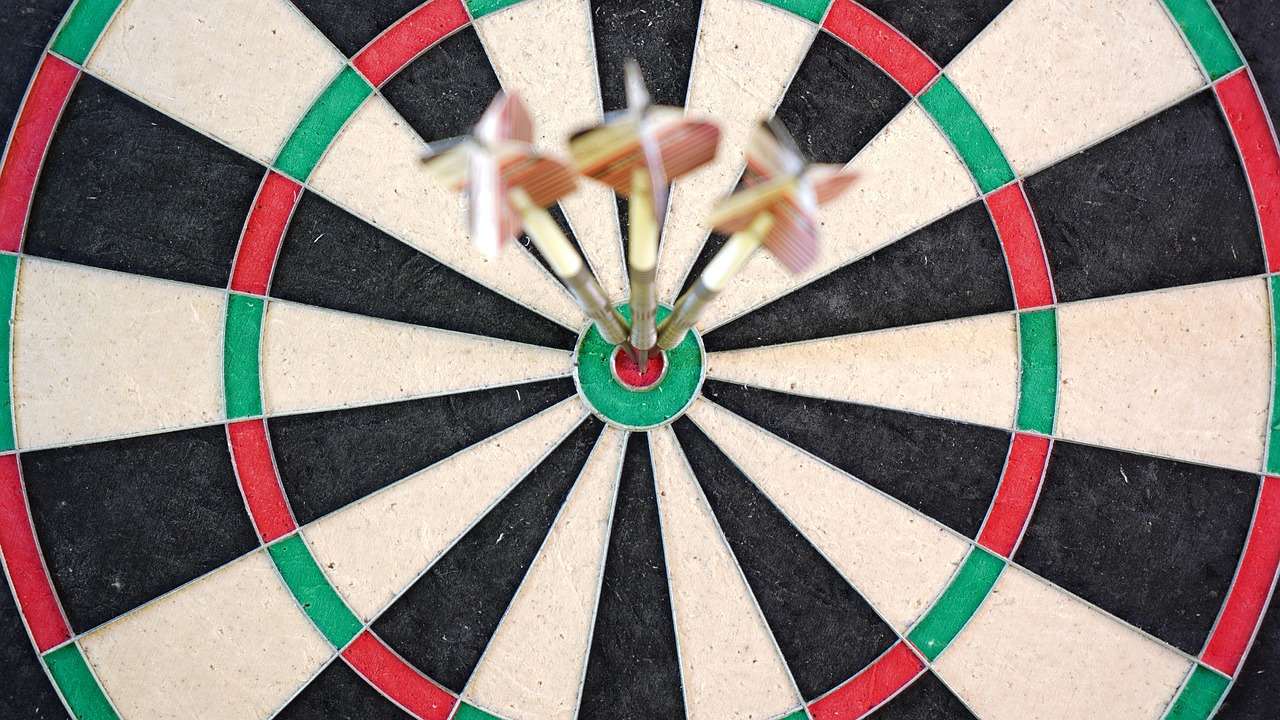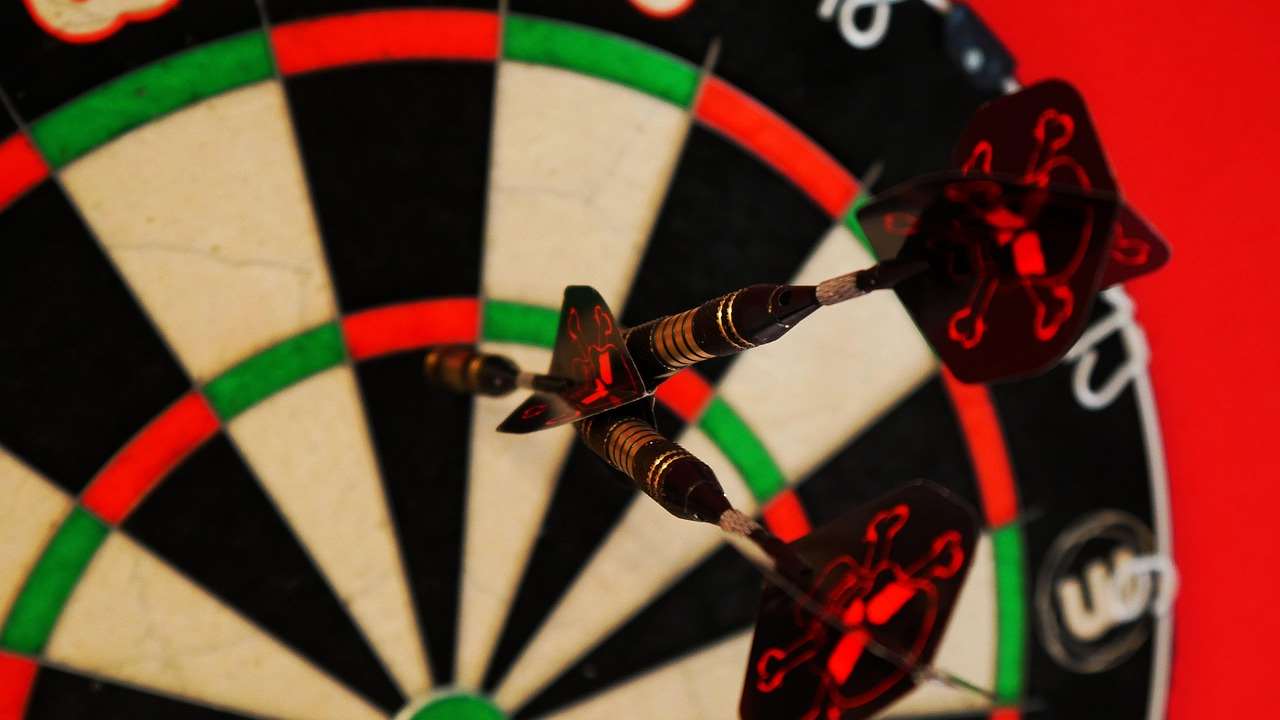Understanding the Darts Etiquette And Sportsmanship Code ensures a fair and enjoyable experience for everyone involved, from casual games to competitive tournaments. This article explores the fundamental principles of good sportsmanship, providing practical guidance on how to conduct yourself respectfully during a darts match, and delve into specific etiquette rules, fostering a positive and inclusive environment for players of all skill levels.
⚠️ Still Using Pen & Paper (or a Chalkboard)?! ⚠️
Step into the future! The Dart Counter App handles all the scoring, suggests checkouts, and tracks your stats automatically. It's easier than you think!
Try the Smart Dart Counter App FREE!Ready for an upgrade? Click above!
Understanding the Foundation: What is Darts Etiquette And Sportsmanship Code?
Darts etiquette encompasses the unwritten rules and expected behaviors that contribute to a respectful and enjoyable atmosphere during a game. It’s about showing consideration for your opponent, maintaining focus, and upholding the spirit of fair play. In essence, it’s about treating others the way you want to be treated.
Sportsmanship, on the other hand, is a broader concept that includes demonstrating honesty, integrity, and respect, even in the face of defeat. A true sportsman accepts both victory and defeat with grace, showing respect for the game, their opponent, and the officials.

Together, darts etiquette and sportsmanship code create a culture of respect and enjoyment within the darting community. Adhering to these principles fosters a more positive environment for all involved and can contribute to the long-term growth and popularity of the sport. You can further enhance your enjoyment and involvement in the darts scene by checking out Darts Culture And Community Guide.
Essential Etiquette Rules in Darts
While not always formally written, several key etiquette rules are widely observed in the darting world. These rules help maintain order, focus, and respect during a match.
Respecting Your Opponent
- Quiet During Throws: Refrain from talking, moving excessively, or making distracting noises while your opponent is throwing. This is perhaps the most fundamental rule of darts etiquette.
- Stay Behind the Throwing Line: Always remain behind the throwing line (oche) when it’s not your turn to throw. Stepping over the line can be distracting and is considered impolite.
- Avoid Disruptive Behavior: Actions like excessive celebration after a good throw, excessive complaining about bad luck, or any form of taunting are generally frowned upon.
Maintaining Focus and Flow
- Be Prepared: Have your darts ready and approach the oche promptly when it’s your turn to throw. This helps maintain the pace of the game.
- Retrieve Darts Efficiently: When collecting your darts, do so quickly and efficiently, avoiding unnecessary delays.
- Avoid Excessive Chalking: If you are the scorer, chalk the scores promptly and accurately, without unnecessary delays or distractions.
General Courtesy
- Congratulate Your Opponent: Regardless of the outcome, always offer a sincere congratulation to your opponent after the match.
- Shake Hands: A handshake at the beginning and end of a match is a standard sign of respect.
- Respect the Equipment: Treat the dartboard, darts, and other equipment with respect. Avoid damaging or defacing them.

Upholding the Principles of Sportsmanship in Darts
Beyond basic etiquette, demonstrating good sportsmanship is crucial for creating a positive and respectful darting environment. This includes:
Honesty and Integrity
- Accurate Scoring: Ensure that scores are recorded accurately, even if it means correcting a mistake that benefits your opponent.
- Adhering to the Rules: Play by the rules of the game, without attempting to bend or break them to gain an unfair advantage.
- Acknowledging Mistakes: If you make a mistake (e.g., accidentally stepping over the oche), acknowledge it immediately and correct it.
Respect and Courtesy
- Accepting Defeat Gracefully: Avoid making excuses or blaming others for your loss. Acknowledge your opponent’s skill and effort.
- Celebrating Victory Modestly: Avoid excessive or boastful celebrations that could be seen as disrespectful to your opponent.
- Supporting Fellow Players: Offer encouragement and support to other players, regardless of their skill level.
Fair Play
- Avoiding Gamesmanship: Refrain from using tactics that are technically legal but designed to unfairly distract or intimidate your opponent.
- Maintaining a Positive Attitude: Focus on enjoying the game and playing your best, rather than trying to undermine your opponent.
For those looking to create a more organized darts environment, consider Organizing Local Darts League to formalize these principles.
Navigating Different Darting Environments
The specific etiquette expectations can vary depending on the environment. What’s acceptable in a casual pub game might not be appropriate in a competitive tournament.
Casual Games vs. Competitive Tournaments
- Casual Games: While good sportsmanship is always essential, the atmosphere in casual games is generally more relaxed. A bit of friendly banter and light-hearted ribbing is often acceptable, as long as it doesn’t cross the line into disrespect.
- Competitive Tournaments: In tournaments, the focus is on serious competition, and a higher level of formality is expected. Strict adherence to the rules and a more subdued demeanor are typically required.
Local Pubs vs. Dedicated Darts Venues
- Local Pubs: In pubs, be mindful of the other patrons and avoid disrupting their experience. Keep your voice down and be aware of your surroundings.
- Dedicated Darts Venues: Dedicated venues often have specific rules and regulations regarding etiquette, so be sure to familiarize yourself with them.

Specific Scenarios and How to Handle Them
Here are some specific scenarios you might encounter and how to handle them with grace and good sportsmanship:
Dealing with a Distracting Opponent
If your opponent is engaging in behavior that you find distracting, address the issue calmly and respectfully. Politely ask them to refrain from the behavior, explaining that it is affecting your concentration. If the behavior persists, consider involving a referee or official, if one is available.
Handling a Close Loss
Losing a close match can be frustrating, but it’s important to accept the defeat with grace. Avoid making excuses or blaming your opponent for your loss. Instead, congratulate them on their victory and focus on what you can learn from the experience. Consider reflecting on your performance and identifying areas for improvement.
Responding to Poor Sportsmanship
If you encounter an opponent who is displaying poor sportsmanship, avoid retaliating in kind. Instead, maintain your composure and focus on playing your best game. If the behavior is egregious or violates the rules of the competition, report it to a referee or official.
If you are interested in starting or improving a darts club to ensure these rules are followed, see How To Build A Darts Club.
The Impact of Positive Darts Etiquette And Sportsmanship Code
Adhering to a strong Darts Etiquette And Sportsmanship Code has numerous benefits for individuals and the darting community as a whole.
Improved Playing Environment
Good etiquette creates a more enjoyable and respectful atmosphere for all players, regardless of their skill level. This can lead to increased participation and a stronger sense of community.
Enhanced Reputation
Players who consistently demonstrate good sportsmanship earn the respect of their peers and enhance their reputation within the darting world. This can open doors to new opportunities and collaborations.

Promoting the Sport
By upholding the principles of Darts Etiquette And Sportsmanship Code, players contribute to the positive image of the sport and help attract new players. This can lead to increased popularity and growth for the darting community.
You can further contribute to a thriving darts community by actively Recruiting Members Darts League Club.
Tips for Improving Your Darts Etiquette And Sportsmanship
Here are some practical tips for improving your darts etiquette and sportsmanship:
- Be Mindful of Your Behavior: Pay attention to your actions and words, and how they might be perceived by others.
- Practice Empathy: Try to put yourself in your opponent’s shoes and understand their perspective.
- Lead by Example: Demonstrate good sportsmanship in your own actions and encourage others to do the same.
- Seek Feedback: Ask trusted friends or fellow players for feedback on your etiquette and sportsmanship.
- Learn from Your Mistakes: If you make a mistake, acknowledge it, apologize, and strive to do better in the future.
The Role of Darts Organizations
Darts organizations play a vital role in promoting and enforcing Darts Etiquette And Sportsmanship Code within their respective communities. They can:
- Establish Clear Guidelines: Develop and communicate clear guidelines regarding etiquette and sportsmanship.
- Provide Education and Training: Offer educational programs and training sessions on proper conduct.
- Enforce the Rules: Implement mechanisms for addressing violations of etiquette and sportsmanship.
- Recognize and Reward Good Sportsmanship: Publicly acknowledge and reward players who consistently demonstrate exemplary behavior.

Consider that by Setting Up A Darts Club, you can also help promote sportsmanship.
Conclusion: Embracing the Spirit of Darts
In conclusion, understanding and embracing the Darts Etiquette And Sportsmanship Code is essential for creating a positive, respectful, and enjoyable darting experience for all. By adhering to these principles, you not only improve the playing environment but also enhance your own reputation and contribute to the overall growth and popularity of the sport. Remember that showing respect, maintaining focus, and upholding fair play are the cornerstones of good sportsmanship in darts. Now, go out there, practice your throws, and remember to always play with integrity and respect for the game and your fellow players. Consider joining a local darts league or club to further immerse yourself in the community and practice these principles regularly!
Hi, I’m Dieter, and I created Dartcounter (Dartcounterapp.com). My motivation wasn’t being a darts expert – quite the opposite! When I first started playing, I loved the game but found keeping accurate scores and tracking stats difficult and distracting.
I figured I couldn’t be the only one struggling with this. So, I decided to build a solution: an easy-to-use application that everyone, no matter their experience level, could use to manage scoring effortlessly.
My goal for Dartcounter was simple: let the app handle the numbers – the scoring, the averages, the stats, even checkout suggestions – so players could focus purely on their throw and enjoying the game. It began as a way to solve my own beginner’s problem, and I’m thrilled it has grown into a helpful tool for the wider darts community.